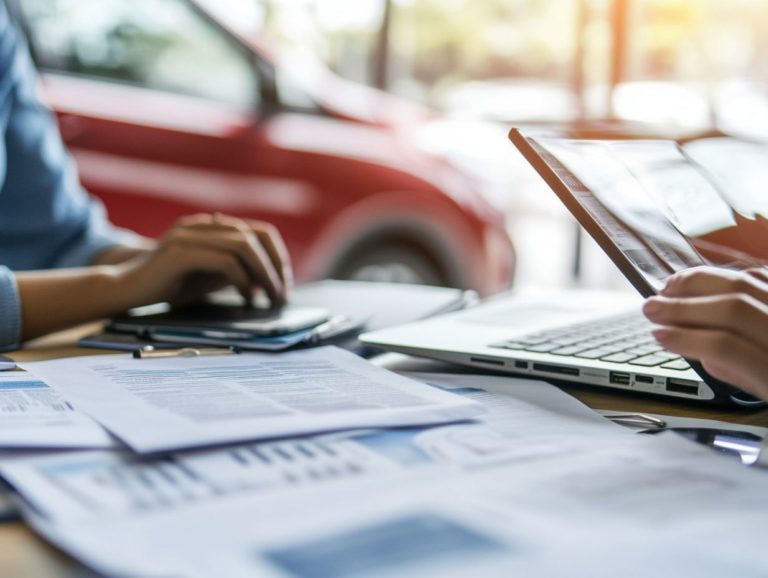What Documents Do You Need to Buy a Car?
Purchasing a car is an exhilarating journey, yet it often comes with a daunting array of paperwork that can leave you feeling overwhelmed.
Understanding the essentials from basic requirements to financing documents and insurance can significantly streamline your experience. This article will guide you through the crucial documents needed for buying a car, whether it s new or used. You’ll find insights into inspection and registration papers, along with important tips for out-of-state purchases.
Get ready to drive away with confidence! We ll make sure you have everything you need.
Contents
Key Takeaways:
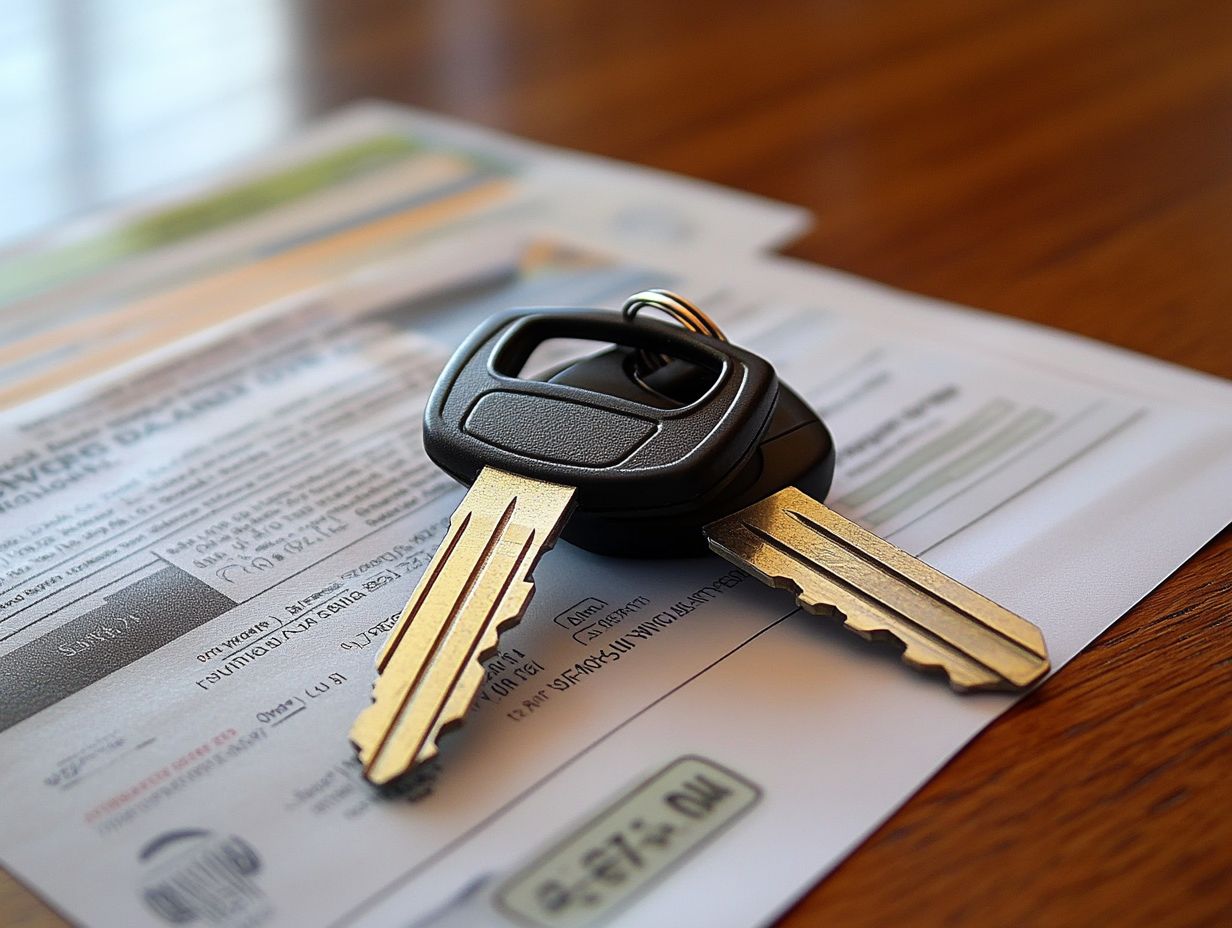
Gather essential documents like your driver’s license and income proof to make your purchase easier. For financing, you may need documents such as your credit score, bank statements, and proof of address. Don’t forget to obtain the vehicle inspection report, registration and title documents, and proof of insurance before driving your new car off the lot.
Documents Required for Purchasing a Car
When you set out on the journey to purchase a car, it s crucial to compile a thorough collection of documents that will underpin your transaction. This paperwork includes your driver s license, proof of auto insurance, financing documents for your car loan, and vehicle registration each essential for facilitating a smooth and legal acquisition process.
If you’re in California, you may also need specific documents related to state regulations. Fortunately, services like Cartelligent and various auto manufacturers can assist and guide you through this intricate process, ensuring that every detail is taken care of.
Basic Requirements
The fundamental requirements for purchasing a car involve having essential documents ready, including a valid driver’s license, proof of auto insurance, and proof of residence.
You will also need proof of income to demonstrate your capacity to afford the vehicle. When you have these documents organized, navigating the car-buying process becomes significantly smoother, allowing for more effective communication with dealerships and lenders.
Your valid driver’s license verifies your identity and confirms your eligibility to drive. Proof of auto insurance ensures that your new vehicle is covered from day one.
Providing proof of residence such as a recent utility bill or lease agreement establishes your stability, which is often reassuring for lenders. A solid credit score is equally crucial; it affects your financing interest rate and plays a key role in securing loan approvals.
Regarding proof of income, presenting recent pay stubs or tax returns can reflect your financial reliability and ability to manage monthly payments.
Additional Documents for Financing
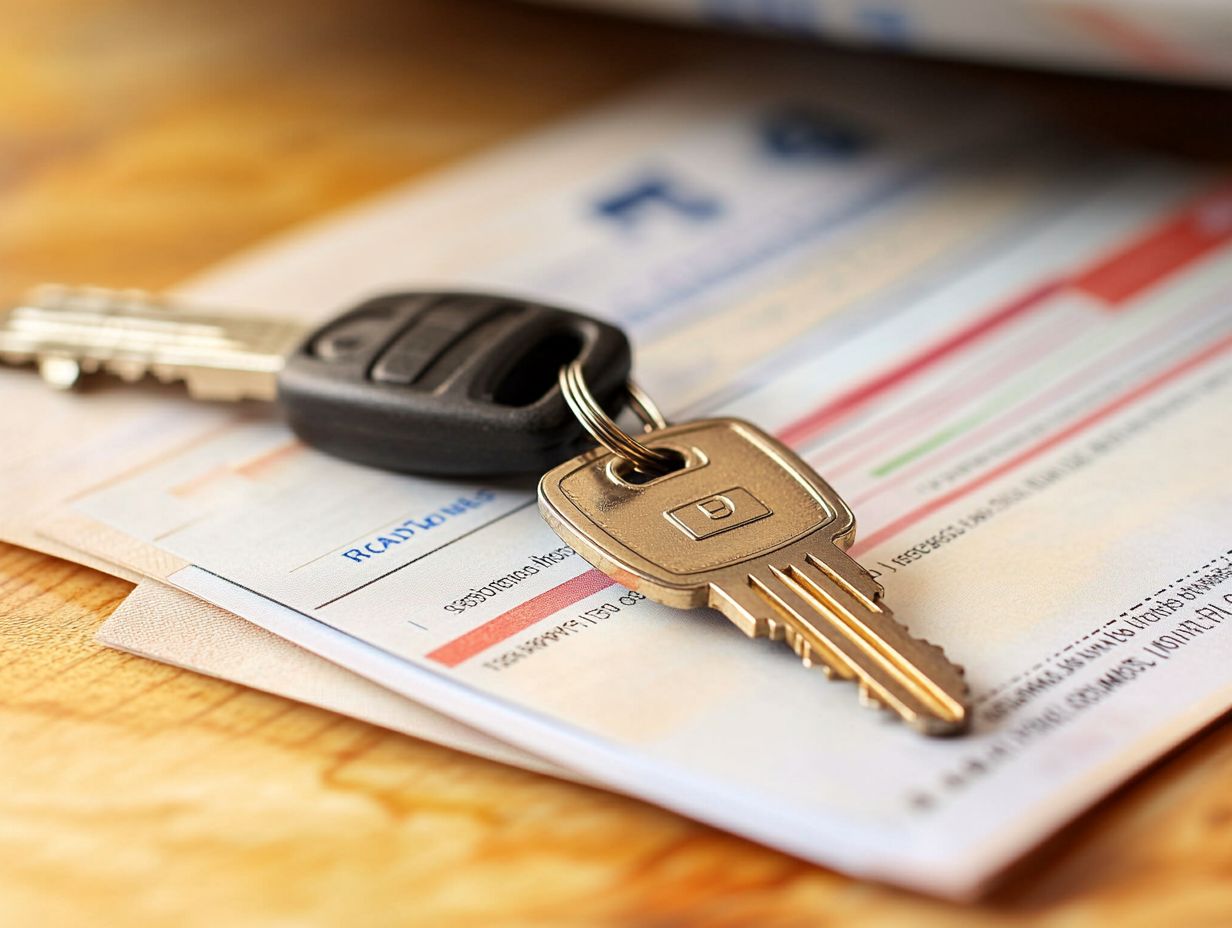
When you’re hunting for a car loan, having the right financing documents in hand is essential. Your credit score, personal references, and trade-in information play significant roles in influencing your loan approval and its terms.
Proof of income is often vital for lenders to assess your repayment ability. This could mean presenting recent pay stubs, bank statements, or tax returns.
A solid credit history reflects your reliability and opens the door to more favorable interest rates. Including personal references adds an extra layer of credibility to your application, underscoring your trustworthiness.
Don t overlook the importance of having all your trade-in documentation ready. This can act as a powerful negotiation tool, potentially leading to better loan conditions and ensuring you maximize the value you receive.
Inspection and Registration Documents
Having the proper inspection and registration documents is paramount for vehicle ownership, particularly in California, where regulations are notably stringent.
As a buyer, you’ll need to secure a vehicle inspection report to confirm that the car meets the necessary safety and emissions standards. Additionally, obtaining the essential vehicle registration and smog certificate required by the California DMV is a must.
These documents not only authenticate the vehicle’s condition but also streamline the transfer of ownership via the certificate of title, ensuring a smooth and legally compliant acquisition process.
Vehicle Inspection Report
A vehicle inspection report is essential. It tells you whether your car meets safety and emissions standards and is often required alongside a smog certificate for vehicle registration.
This report includes a thorough check of key components like brakes, tires, lights, and exhaust systems. This ensures your vehicle is roadworthy and environmentally compliant.
In California, you can obtain this inspection at various certified stations. Trained professionals will assess your vehicle’s performance and integrity. The smog certificate confirms that your car meets state emissions regulations.
This verification greatly influences your registration and your ability to drive legally. A successful inspection and smog certificate enhance your safety and contribute to a cleaner environment for everyone.
Registration and Title Documents
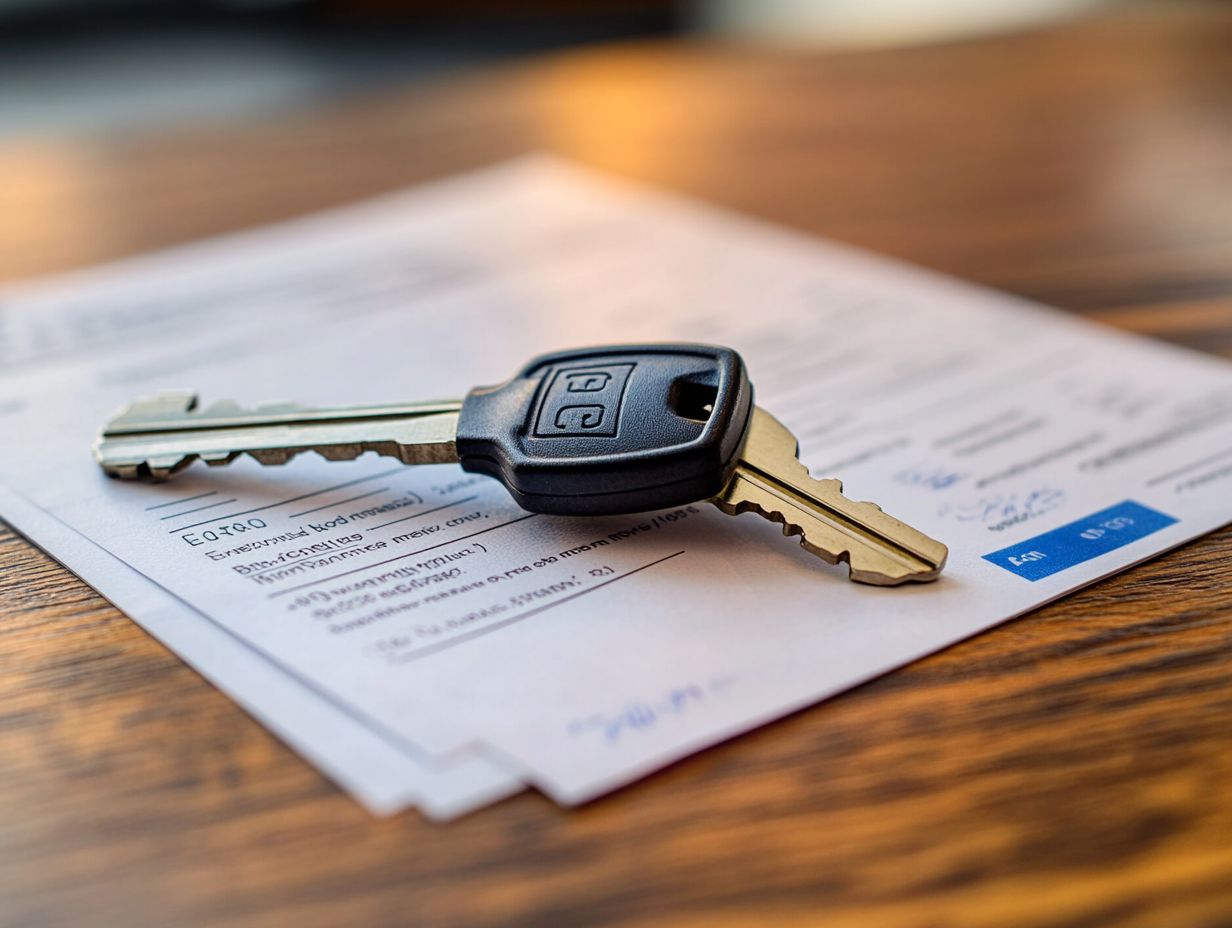
To finalize your car purchase, having the vehicle registration and certificate of title is crucial. These documents establish ownership and streamline the registration process with the California DMV.
Start by gathering the necessary paperwork, such as the bill of sale and prior registration documents. Next, submit your application for title transfer and registration, either online or in person at a DMV office.
Remember, there are fees involved, which can vary based on the vehicle type and your location. Some vehicles may require a smog certification. It s smart to be ready to meet all regulatory requirements for a smooth transaction with the DMV.
Insurance Documents
Insurance documents, especially proof of auto insurance, are essential when purchasing a car. They protect your investment and are often required by dealerships before you can finalize the sale.
Proof of Insurance
Proof of auto insurance is a must for car buyers. It serves as clear evidence that your vehicle is adequately insured against potential damages and liabilities.
Understanding the different types of auto insurance policies is key. Common options include:
- Liability coverage: Protects you against damages you may cause to others.
- Comprehensive coverage: Covers incidents unrelated to collisions.
It’s also crucial to know what qualifies as acceptable proof of insurance. Many insurers provide a card or electronic document with your policy number and effective dates.
Before finalizing your car purchase, obtain this documentation by contacting your insurance company whether through a quick phone call or their online portal. This will ensure you have everything in order to confidently drive off the lot.
Additional Coverage Options
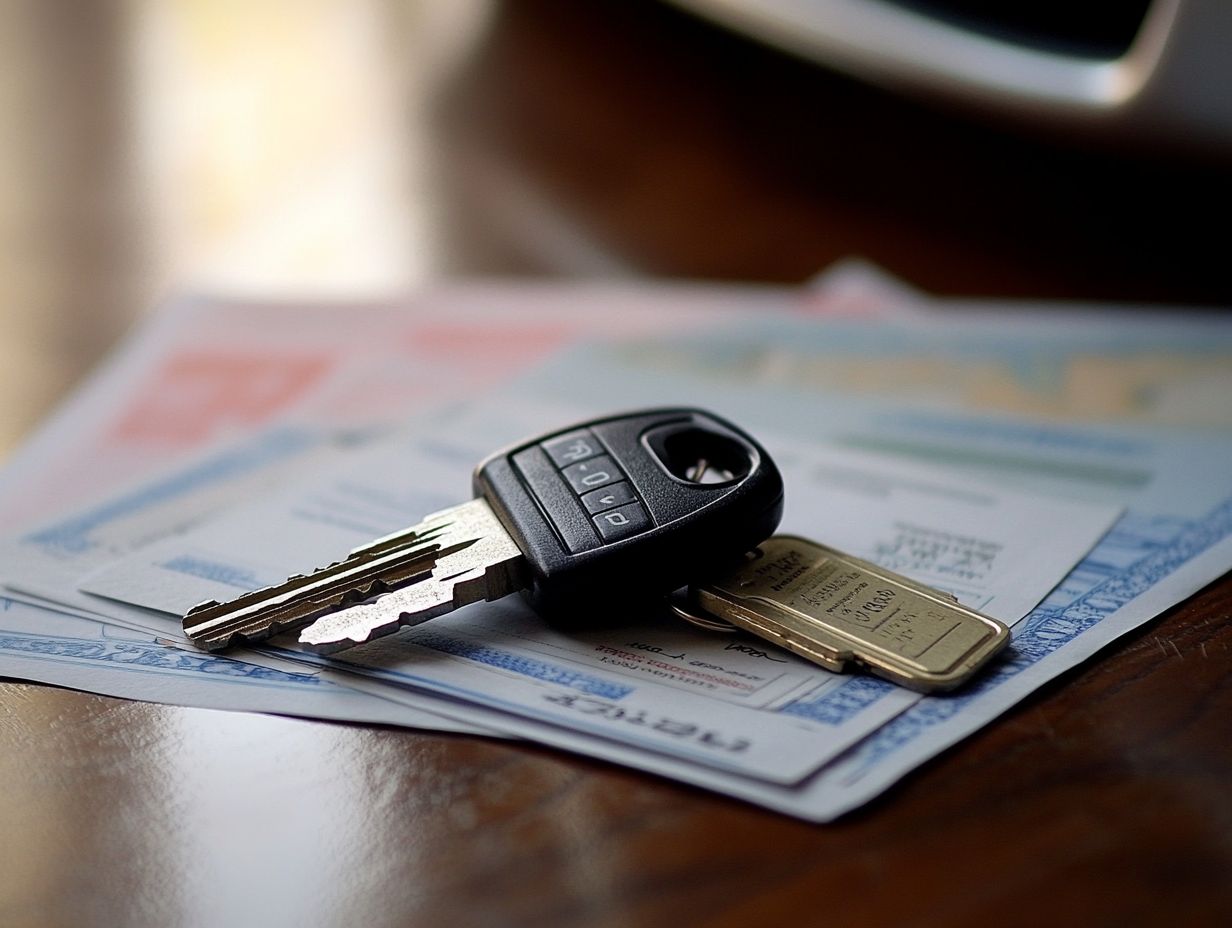
When you re shopping for a car, exploring additional coverage options in auto insurance can offer you enhanced protection and peace of mind as a new vehicle owner.
Consider comprehensive and collision options, as both can significantly strengthen your financial security.
Comprehensive coverage: Protects you against non-collision incidents like theft, vandalism, or natural disasters, ensuring your investment stays safe in unexpected situations.
Collision coverage: Covers repair costs when accidents happen, regardless of fault.
Many dealerships recommend specific policies that align with the vehicles they sell. These insights are invaluable, guiding you to make informed choices and ensuring you’re adequately covered as you embark on your new automotive adventure.
Additional Considerations
When you’re in the market for a vehicle, especially a used car, keep a few extra details in mind.
If you’re military personnel, a recent college graduate, or a first responder, specific documents may be necessary to navigate your unique circumstances smoothly.
As you assess used cars, make sure to closely check their condition and history. Fortunately, military personnel and recent graduates often have access to special financing options or discounts designed for them, making the purchasing process more favorable.
Special Requirements for Used Cars
Diving into the world of used cars comes with essential requirements. Ensure you have a vehicle history report, a bill of sale, and a clear title to facilitate a valid sale.
These documents protect you from unexpected liabilities that could arise later. The vehicle history report is particularly crucial, as it offers a glimpse into the car’s past, including any accidents, title issues, or odometer discrepancies that might impact its value and your safety.
The bill of sale serves as your formal receipt, detailing the agreed-upon terms and making the sale legally binding. Lastly, securing a clear title confirms that the seller genuinely owns the vehicle, free from any liens or encumbrances, helping you avoid potential disputes down the line.
Documents for Out-of-State Purchases
Purchasing a car from out of state requires specific documents for the California DMV, such as the vehicle identification number and proof of residency.
You will also need to provide a bill of sale that outlines the details of the transaction and, often, the original title from the selling state. It’s important to confirm that this title is free of any liens or obligations.
Consider obtaining a smog certification, especially if the vehicle comes from a state with different emissions standards.
Gathering these documents typically involves reaching out to the seller to ensure they have the title ready and any additional paperwork needed for the transfer.
Act quickly to gather these documents! They are essential for a smooth buying experience and will help you proceed with the registration process in California, ensuring a seamless transition of ownership.
Frequently Asked Questions
What Documents Do You Need to Buy a Car?
To purchase a car, you will need key documents to ensure a smooth transaction. These include a valid driver’s license, proof of insurance, and a method of payment.
Do I Need a Driver’s License to Buy a Car?
Yes, a valid driver’s license is required to legally operate a vehicle and is necessary to complete the purchase. You will need to provide your driver’s license as proof of identification when buying a car.
What Type of Insurance Do I Need When Buying a Car?
To buy a car, you will need proof of insurance. This can be an insurance card or a letter from your insurance company. The insurance policy must be active and meet the state’s minimum requirements.
Can I Use a Credit Card to Buy a Car?
While some dealerships may accept credit cards as payment, it’s generally not recommended. Credit cards often have high-interest rates and may not have a limit sufficient to cover the full cost of the car.
What Other Documents Do I Need for a Car Purchase?
In addition to a driver’s license and proof of insurance, you may also need to provide proof of income, such as pay stubs or bank statements, and proof of residence, like a utility bill or lease agreement. These documents may be necessary for financing or to register the vehicle.
Do I Need a Bill of Sale to Buy a Car?
A bill of sale is not always required, but it is recommended for your records. This document acts as a receipt and includes information such as the purchase price, vehicle identification number (VIN), and signatures of both the buyer and seller.

